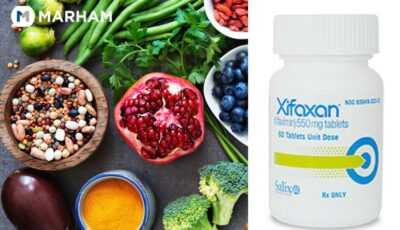Balancing your diet with medications like Xifaxan can seem challenging as the drug shows considerable drug-food interactions. It’s essential to understand what foods you should avoid to ensure the optimal efficacy of your treatment. The foods to avoid while taking Xifaxan will vary and depend on the reason you’re taking it.
Consult a doctor before using the medicine if you have disease symptoms.
What is Xifaxan drug?
Xifaxan is an FDA-approved prescription antibiotic containing rifaximin. This broad-spectrum medicine treats several bacterial infections, such as irritable bowel syndrome (IBS) and traveler’s diarrhea due to E.coli. The medicine shows several drug-drug and drug-food interactions.
Mechanism of Xifaxan drug-food interaction
Xifaxan has minimal systemic absorption and low potential to interact with foods. However, some foods slow their absorption and increase exposure to the system. This can increase the risk of adverse drug reactions and Xifaxan toxicity.
Dietary considerations are recommended for people, especially those with liver diseases, when taking the medicine.
To avoid complications, talk to a doctor and get a personalized diet plan that can help optimize your treatment with Xifaxan antibiotic.
Side effects caused by Xifaxan
Xifaxan has a few side effects that can worsen with the wrong choice of foods. Some of these include;
- Headache
- Rectal tenesmus
- Abdominal pain
- Defecation urgency
- Nausea
- Constipation
- Swelling
- Pyrexia
- Vomiting
- Abnormal liver function tests
Food to avoid while taking Xifaxan
Prescription Xifaxan antibiotic makes it a safe choice, but certain dietary recommendations are essential to reduce adverse drug interactions. The foods to eat and avoid while taking the medicine vary from person to person. For example, avoid foods that worsen the symptoms if you have IBS. If you suffer from diarrhea, eat a bland and easily digestible diet.
The general recommendations of foods to avoid while taking Xifaxan include;
Insoluble fibers
Managing gastrointestinal conditions like IBS-D with Xifaxan requires careful dietary modifications. While high-fiber foods are nutritious, overconsumption of insoluble ones aggravates symptoms like bloating, gas, and abdominal discomfort.
The fruit and vegetable skin is particularly rich in insoluble fibers. A few of the other foods in this category include;
- Whole grains
- Vegetables like green beans, cauliflower, and potatoes
- Fruits like avocado, apple, banana, and oranges.
Balancing your diet while limiting the intake of these foods can be advantageous for symptom management and avoiding drug interactions with them.
Gluten
Gluten is a structural protein in many foods and imparts a stretchy texture to them. People with gastrointestinal tract sensitivities must avoid gluten as it can trigger harmful immune responses. It also damages the small intestine and causes symptoms like diarrhea, abdominal pain, and bloating.
Some examples of foods that contain gluten include;
- Pasta
- Cereals
- Baked food
- Bread
- Wheat
- Barley
High-Fat foods
One of the major foods to avoid while taking Xifaxan includes a high-fat diet. After 30 mins of taking rifaximin, consuming a high-fat diet delayed the peak plasma concentration of the drug from 0.75 to 1.5 hours. These foods also increase the systemic exposure of the drug by 2-folds.
Such foods increase the absorption of the drug in the body and thus the risk of its side effects. Some foods that are loaded with saturated fats include;
- Heavy cream
- Cheese
- Fried food
- Fatty meat
- Poultry skin
Caffeinated beverages and Frizzy drinks
Carbonated beverages, including cola and energy drinks, may induce gas and bloating, which can exacerbate the discomfort experienced by IBS patients or those on Xifaxan. Furthermore, the lactose present in some fizzy drinks might trigger symptoms, particularly among those with lactose intolerance
Fructose is a sugar found abundantly in these drinks. High fructose levels can pose a problem as some individuals have difficulty absorbing it, escalating IBS symptoms.
Caffeine, a common ingredient in coffee, chocolate, and specific teas, has a stimulative effect on the intestines. This can lead to an increase in bowel movements, potentially worsening diarrhea symptoms. Therefore, people with IBS and on Xifaxan therapy are often advised to limit or avoid caffeine intake.
Raw meat and eggs
When taking Xifaxan, it’s important to maintain a balanced diet. Raw or poorly cooked meat, including fish, can increase your risk of bacterial infection, particularly if you already suffer from traveler’s diarrhea. This is especially common in people with diarrhea due to bacteria-contaminated food or drink.
Foods to avoid due to the risk of bacterial contamination include raw sushi and undercooked egg yolks. The ideal internal temperatures for different meats and egg-based foods are;
- Poultry: 165°F
- Ground meat and egg dishes: 160°F
- Fish, steaks, roasts: 145°F (beef, veal, pork, and lamb should rest for an additional three minutes after reaching this temperature)
Taking Xifaxan does not specifically require you to avoid certain foods unless advised by the doctor but adhering to these food safety guidelines can help ensure optimal health and recovery.
Grapefruit juice
Rifaximin, the active ingredient in Xifaxan, is a P-glycoprotein (P-gp) substrate, while grapefruit juice is a known P-gp inhibitor. It is vital to avoid consuming grapefruit or grapefruit juice while undergoing treatment with Xifaxan.
When grapefruit juice is used with a P-gp substrate like Rifaximin, it can inhibit the P-gp and significantly increase the body’s exposure to the drug—in some cases, raising overall exposure by as much as 124-fold. This drastic increase can result in unexpected and potentially serious side effects.
Conclusion
The food sensitivities and interactions withXifaxan vary between individuals, especially for those with IBS. Understanding your body’s response to different foods is important, focusing on those foods that promote wellness and minimizing those that provoke discomfort. Consider maintaining a food diary to track your symptoms and identify foods best suited for your dietary needs.
If you are taking Xifaxan, consult a doctor for guidance that reduces the adverse drug-food interactions.

